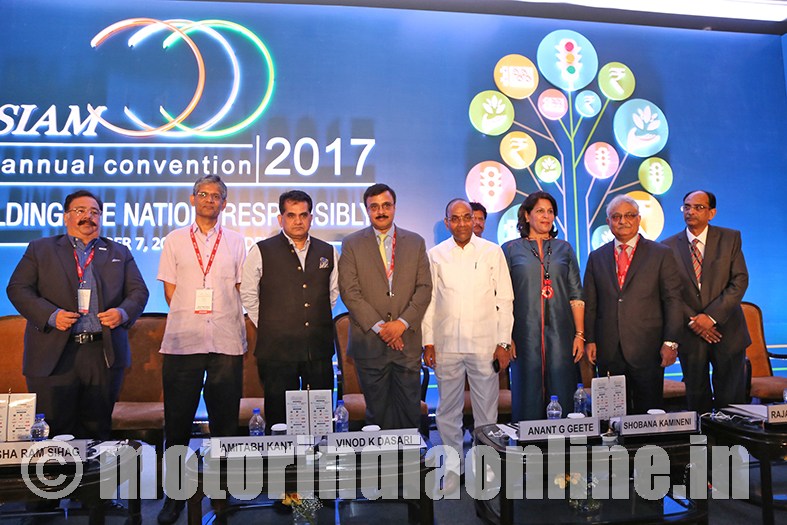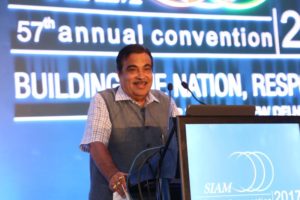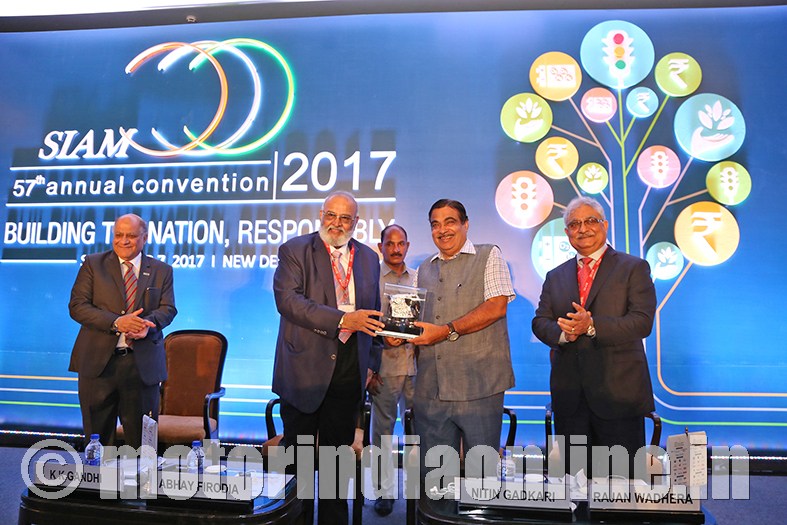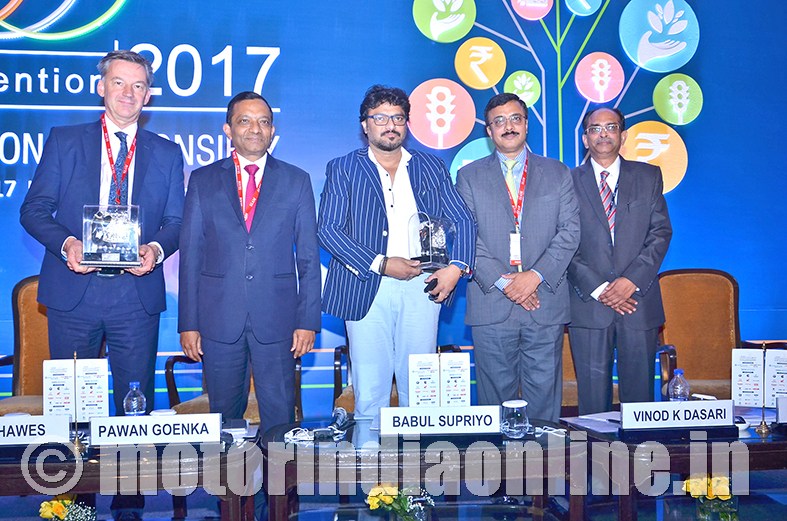The Society of Indian Automobile Manufacturers (SIAM), the industry body representing India’s automobile sector, held its 57th Annual Convention in New Delhi where the Union Minister of Road Transport & Highways, Mr. Nitin Gadkari called upon the auto industry to gear up to face the competition heating up in the international market.

Speaking at SIAM’s Annual Convention titled “Building the Nation, Responsibly”, Mr. Nitin Gadkari said the Indian automotive industry has done well despite facing various regulatory hurdles and environmental issues. Mr. Gadkari said the theme of the convention: ‘Building the Nation, Responsibly’ gelled well with the Government of India initiative “SANKALP Se SIDDHI”.
“I am proud to say that the auto industry has always been one among the leading players in our nation building, and that too responsibly. When it comes to sustainable and environment friendly transportation, the Indian auto industry took up the challenge and agreed to go through the pain of leapfrogging towards better environment by accepting BS6 norms from 1st April 2020,” Mr. Gadkari observed.
However, at the same time, the industry also needs to move towards zero emission regime with electric vehicles, he added.
Although the Minister was bullish on the size and potential of the Indian auto industry and directly linked it to India’s GDP growth, he pointed out that as more vehicles are coming on road, the Government will have to increase lanes of roads and highways to meet the demand.

“This is something big that the country cannot handle in the existing infrastructure alone. The industry and the Government must come up with a diversified solution. We need to bring in qualitative reforms in the automobile sector and expand the scope of rural transportation while bringing in newer technologies and encourage electric vehicles,” Mr. Gadkari asserted.
Welcoming the delegates, Mr. Vinod K. Dasari, President, SIAM, and CEO & MD of Ashok Leyland said India’s automobile industry is today standing on the threshold of major transformations and unprecedented challenges.
Mr. Dasari urged the government to create a National Automotive Board which considers the concerns of all factions and then prepares a clear and ambitious, long term roadmap for regulations that are in the best interest of the country. “We do not need to simply copy the regulations from Europe,” he pointed out.
The SIAM President also called for providing greater impetus for doing more Design in India as this is the only way we will gain traction with Government’s ‘Make in India’ initiative.
He also appealed to the Government to bring in legislation to reduce polluting vehicles and ban vehicles which are more than 15 years old. “To reduce pollution we have committed to Euro 6 levels in 2020 already. We request that you please bring in legislation to reduce polluting vehicles and ban vehicles which are more than 15 years old,” Mr. Dasari explained.

He also announced that as a voluntary measure, SIAM will initiate three more Voluntary Codes of Practice a Full compliance to the Bus Body Code which is ready but yet to be implemented by Government, banning use of certain materials in the manufacturing processes for vehicles and components that are now globally known to have hazardous effects on the health of people; and making all Vehicle Recall data available on the SIAM and the MoHI Websites for public consumption.
“Any country with a strong defence force also has a dynamic and committed auto industry that provides the backbone for the defence equipment. India is no different. We generate over 30 million jobs, spend more than 10% of the country’s R&D, and contribute to over half the manufacturing GDP. We are slowly but surely becoming an integral part of the security of our nation,” he stated.
Mr. Venu Srinivasan, Chairman, TVS Motor Company Ltd., was of the view that GST and demonetisation will make the economy a lot more transparent. He also shared his views on the inevitable shift towards electrification. “The most important disruption is electrification. It is something certainly going to happen by 2030 or 2040, I cannot say. But at least 30 per cent of the vehicle will be electric,” said Mr. Srinivasan.

Dr. Abhay Firodia, Chairman, Force Motors, said that the Government is closely monitoring the DNA of the manufacturing industry, especially the auto sector in India to ensure that it is at par with global standards.
Mr. Kenichi Ayukawa, SIAM Treasurer, and Managing Director & CEO, Maruti Suzuki India Ltd., called India a unique country where the auto industry offers large scale employment. He however pointed out that there are some concerns with issues related to CO2 emissions, growing traffic and accidents.
Earlier, speaking at the inaugural session, Union Minister of Heavy Industries and Public Enterprises, Mr. Anant G. Geete said India’s automobile industry has been a primary contributor to Prime Minister Narendra Modi’s ‘Make in India’ initiative.
“We, as the guardian of the automobile sector, assure you that the government will do everything and help the industry by all means. There are concerns raised over GST, Goods and Service Tax, unified tax regime implemented on July 1 and its impact on auto industry. I assure you that it is the duty of the Government to offer all help to the industry in this regard,” Mr. Geete stated. The Minister also launched a voluntary vehicle recall initiative by SIAM.
Mr. Amitabh Kant, CEO of NITI Aayog, Government’s main policy think-tank, calling India’s automotive industry as the pride of the country said it played a very crucial role in India’s growth. “The Government feels that the courts should have hands-off approach,” he stated.
Ms. Shobana Kamineni, President, Confederation of Indian Industry, and Executive Vice-Chairperson, Apollo Hospitals Enterprise Ltd., said NPA and subdued demand is one of the challenges today. “Creating new jobs and industrial infrastructure is also a worry. The auto industry is wherewithal of the entire economy.” She also called for joint initiative in areas for smart manufacturing and skilling.
At the concluding session titled “Transforming Mobility”, Mr. Sumit Sawhney, Country CEO & MD, Renault India Private Ltd., said the biggest transformation has been in the mobile industry which has eventually widened the means of communication.
Dr. Pawan Goenka, Managing Director, Mahindra & Mahindra, while addressing the valedictory session titled “Think Global, Act Local or Think Local, Act Global”, said Indian auto companies need to work on these principles. He gave an example of Maruti Suzuki India saying “It has fully developed itself as an Indian automobile giant from a Japanese auto company, doing so as it fit in with the Indian ecosystem.”
Dr. Goenka further explained that to remain competitive, the large Micro, Small & Medium Enterprises (MSME) sector has to be tapped and provided skill development, access to technology and ecosystem. “The Government has taken policy initiatives as required. We would face the challenge of competitiveness as we are moving towards global operations,” he asserted. He called for protection, creating an environment for local companies to grow and flourish and also urged the government to formulate policies for the auto sector carefully and in a balanced way keeping in mind FDI and foreign stakeholders.
The concluding session also witnessed an exciting speech delivered by Mr. Babul Supriyo, Union Minister of State for Heavy Industries & Public Enterprises. He called upon the global auto CEOs to increase manufacturing in India. He compared the geographic location of China and India, saying the latter can be a global manufacturing hub as it has many advantages over others. He assured the industry that issues like GST and other bottlenecks would be gradually worked out to make it hassle-free. “We are in the very changing face of technology. Smaller vehicles are more compliant with the global rules. It is all about how we can make it more functional,” he said.
Mr. Eyal Rosner, Founder, Beyond Mobility and Former Director, Fuel Choices Initiative of Prime Minister’s Office, Israel, called for discussion to cut down the use of crude oil and reduce dependency on it. He explained that the countries cannot rely on only one solution as it would cost lot of money and involve risks too. He explained that India would need a sizeable amount of energy to push its infrastructure. He further asserted that with limited resources to develop an ecosystem in India for charging vehicles with adequate number of gas stations and charging points it would be a gigantic task for India and that it should start working on it.
Mr. Tim Armstrong, Vice President, Planning Solutions, HIS Markit, spoke on creating a favourable ecosystem in India for the auto market. “We should look at car not as a vehicle but as a service because automotive ecosystems are complicated. Oil and gas powered vehicles too are being challenged by other players in the global market with multi-dimensional changes taking pace,” he shared.
Mr. Mike Hawes, CEO, Society of Motor Manufacturers and Traders, United Kingdom, opined that it is upon the Indian industry to take advantage of the technological shift and change in ecosystem as and when the time comes. “It will differ from UK to India. There are factors like relationship with the government, public and private collaboration, academia, finances, Government and the companies,” said Mr. Hawes.